#kenobi meta
Explore tagged Tumblr posts
Text
Commander Cody, winning a battle with one other clone lieutenant, during the Battle of Sarrish, expecting to regroup to a successful campaign.
Kenobi, who has all of his resources at his disposal, at a major loss that resulted in a devastating massacre.
#codys like: i left you alone for five minutes and return to this#like cody literally had an entire front of droids and tanks and anti air guns against him with one other dude and came out triumphant#but kenobi with armies didn't gain an upper hand at all??#and this is TWO years into the clone wars so he's a seasoned vet#there's no excuse it's incompetence tbh#especially because kenobi called in AIR STRIKES for the ANTI AIR GUNS and all the AIR SHIPS were shot down 🤨#like what did he think was gon happen in that scenario the anti air guns suddenly stop working by a miracle#the miracle was commander cody 🤷🏽♀️#kenobi slander#kenobi crit#kenobi meta#battle of sarrish#star wars#clone wars#star wars clone wars#commander cody#obi wan kenobi
25 notes
·
View notes
Text
yes there's a lot of things to criticize about Star Wars but one thing i will always love it for is being so unabashedly tragic
i'm sure it's been said before, but one of the main things i think powers the SW fandom (fics in particular) is the (in)evitability of it all
time travel fix-its are one of the most popular sub-categories of fics that i've seen (for the prequels at least) but i see it much more rarely in other fandoms. i know each fandom has their own niches that they dig into but star wars fic writers took one look at this decades long story of people who were doomed from the start and said 'not in my house bitch'
and i'm never tired of it, because there's so many places where just one different action could have changed the story entirely, but didn't
was it over the moment Palpatine succeeded in feeding Anakin's fears and his distrust toward the Jedi? the moment the Sith gained control of the senate? what about when the war started, when the Jedi were made generals of men designed to be their executioners? what about when Dooku left the order? when Qui-Gon Jinn died, leaving barely-knighted Obi Wan Kenobi to raise a child he had no idea how to care for? when the Jedi massacred the Mandalorians at Galidraan, leaving Jango Fett primed (hah) for revenge? when Palpatine, and thus the Sith, first gained influence? when the Jedi were tied to the Republic, all the way back at the Ruusan Reformation?
there are so many little moments that turn into this huge web of cause and effect when you take a step back. and in canon, these characters are dooming themselves while we watch, but what reason do they have to do anything different? they don't know they're in a tragedy - its dramatic irony at its goddamn finest
but there's this thing about decisions: for it to be a choice, there has to be another option. and our heroes make their mistakes because that's what they do, while we aren't privy to that other option, leaving that little what-if. it's a favorite human pastime, to think about what might have been.
we start at episode 4, though, fourty or so years after what you could arguably call the start, and find ourselves watching the dominoes fall in place throughout 1, 2, and 3.
and we can hate the choices, hate the tragedy, hate what happened to our beloved characters, but we knew. we had the luxury of knowing.
it's a love story, it's political intrique, it's sci-fi at its finest, and they were dead from the start.
#star wars#star wars prequels#obi wan kenobi#anakin skywalker#qui gon jinn#jedi#sheev palpatine#jango fett#count dooku#padme amidala#rots#aotc#sw prequels#tpm#luke skywalker#leia organa#star wars original trilogy#babe help im musing again#sorry i just have a lot of thoughts#and i love tragedies#star wars meta
2K notes
·
View notes
Text

Thinking about this panel again. Thinking about how Obi-Wan spent the night before a battle meditating on how to find peace, not victory. Thinking about how Obi-Wan sheds his armor, but not his Jedi robes, how he wears his full tabards and cloak and boots. Thinking about how Obi-Wan dresses himself as a Jedi to think about how best to solve this, not as a soldier, but the Jedi he is at his core. Thinking about how Obi-Wan returns to himself as a Jedi, in Jedi clothes, in Jedi meditation, to find a Jedi's way out of this, how when he sheds the outer layer, it's that inner core that is a Jedi through and through. THINKING ABOUT OBI-WAN AS A JEDI.
1K notes
·
View notes
Text
During my last rewatch of the prequels I was actually shocked by how much I've misremembered or decontextualized certain moments in my mind because of how they're often talked about in fandom as showing the Jedi as too arrogant, too bureaucratic, generally just burying their heads in the sand while everything goes bad etc. So I'm gonna try to address every individual scene that typically gets brought up to argue that this is an actual theme in Lucas's portrayal of the Order.
The Council doesn't take Qui-Gon's account of meeting a Sith seriously.
Mace and Ki Adi Mundi do both express doubt this guy could be a Sith. (Understandably! Historically they've never known Sith to be able to hide their existence, and for them to have survived totally in secret for a thousand years is a pretty wild thing for Qui-Gon to be so sure of.)
BUT Yoda admits that the dark side is hard to see, and Mace assures Qui-Gon they'll do everything to find out the identity of the attacker. Later he's ordered to go back to Naboo and try to draw out Maul to discover more. Qui-Gon accepts this and doesn't ask for backup. Why should he? He held his own against Maul before, and Maul's probably not gonna show himself again to face a ton of Jedi. They end up missing the chance to learn who trained Maul because of how things go down, but Qui-Gon's death isn't the result of the Council mishandling the situation.
At the funeral, Yoda says the presence of one Sith means there's another out there. They know they've got to be on guard now and will be, but they've got no more leads for now.
2. Qui-Gon's not here to free slaves.
There's this idea that slavery existing on Tatooine shows the Order is apparently too tied up doing shady things for self-interested politicians (footage not found) to help the people who really need it. But Padme's shocked to know the Skywalkers are slaves for a reason. The truth is there isn't a lot of slavery in the galaxy at this time because the Jedi have helped keep it that way for centuries only by working with the Republic. In TCW we see that Zygerrian slavers have a particular hatred of Jedi because they're literally The Anti Slavery People and did so much of the work to crack down on their trade. But Tatooine is controlled by the Hutts and they simply don't have the resources to start a war with them.
(And honestly, it's crazy how people talk like Qui-Gon's a monster for honestly and apologetically telling Anakin no, that's not why he's here. This is a child he's already indebted to and who has a hero-worshipping idea of Jedi, it would be fucked up for him not to be clear about how he can't help him and his mom.)
3. They doubt Dooku could be behind the assassination attempt.
This I understand shows the Jedi to be a little naive. But they knew Dooku as a good man, and at this point he and his followers are still putting on a show of wanting to secede for idealistic reasons (and a few of them, manipulated by Dooku, actually do have good intentions). Only later do the Jedi learn they're illegally building an army before they've even officially left the Republic and clearly have no interest in the peaceful resolution Padme's been advocating for. And they only find this out because they have Obi-Wan investigate the assassin and this very quickly leads him to Dooku.
4. "Arrogance, yes. A trait more and more common among Jedi. Even the older, more experienced ones."
In context, this line from Yoda is clearly not meant to be taken so seriously. Obi-Wan says he fears Anakin is too arrogant, and this is Yoda's light-hearted way of telling him not to be so hard on him. Part of training a Padawan is learning to trust them so they can grow, and Obi-Wan perhaps needs the reminder that he isn't done learning himself.
Of course Yoda saying this could be partly motivated by them having been caught off guard before by the existence of Darth Maul and the dark side clouding their awareness, as we're told repeatedly throughout the PT they know is a problem. But it's kind of contradictory to take this as confirmation that this is a serious fatal flaw of theirs. If someone acknowledges their own arrogance then they're aware of their ability to be wrong, which means they can't actually be that arrogant. If truly meant in a general sense and not just as a gentle reproof of Obi-Wan, it's a pretty self-deprecating comment coming from Yoda.
5. "If an item does not appear in our records, it does not exist."
Chief Librarian Jocasta Nu gives this haughty response to Obi-Wan looking for Kamino, a system that's not in the Jedi Archives. So being so overly confident in the infallible knowledge of the Jedi, he takes her word for it and totally drops this lead.
Except no, he goes to someone older and wiser to figure out what this actually means. And he and Yoda are forced to conclude that the unthinkable - a trusted person among them somehow had reason to erase information from the archive - must nonetheless be what happened. This is honestly an exception that proves the rule: Kamino, and we can assume only Kamino, is missing from the archive only because it was removed, which is so suspicious it just shows he must be on the right track to discovering something. Jocasta is kind of snooty about it but theirs obviously is supposed to be one of the most accurate and complete databases in the galaxy.
6. Obi-Wan doesn't believe what Dooku tells him about the Senate.
For one thing, in this conversation Dooku's lying about basically everything but this. And I can't ever stress enough that Palpatine is a threat unlike anything the Jedi have ever dealt with before, who's already taken control of so much before they even know they're fighting anything, so the idea that a Sith is controlling the Senate would be really hard for anyone to believe.
Still, we know Obi-Wan reports this to the Council anyway. But it's a vague statement and they still don't have any information to act on. Palpatine soon has them very busy putting out fires in the war, and naturally fighting the Separatists who are led by Sith seems the best way for them to get to the bottom of what exactly is going on with the dark side. And they do finally turn their attention to how power-hungry Palpatine is getting once the war is nearly over and they've got the bandwidth for it, and think about what they might have to do if he's the threat to their democracy they fear, but of course he's too many steps ahead of them all the time.
---
So basically, what we see the Jedi being so guilty of in these examples are thought crimes. When confronted with the crazy explanation that happens to be true, their instinctive reaction is "No, I don't think that's possible." And then they do their due diligence to uncover as much of the truth as they can anyway. And Yoda, the Grand Master of them all, is often the first to admit that their first assumptions could be wrong. But Palpatine wouldn't be a good villain if his moves were predictable and he couldn't get an advantage over the good guys - that's just how storytelling works sometimes and it's not that deep.
It honestly felt stupid typing so much of this out because it's 90% just describing what actually happens in these scenes. But I guess it's a lot to ask that people actually carefully watch the films they discuss. 😒
1K notes
·
View notes
Text
I was reading the Attack of the Clone's script for *research* purposes, and it's been a while since I've seen the full movie but:
OBI-WAN: You look tired. ANAKIN: I don't sleep well, anymore. OBI-WAN: Because of your mother? ANAKIN: I don't know why I keep dreaming About her now. I haven't seen her since I was little. OBI-WAN: Dreams pass in time. ANAKIN: I'd rather dream of Padmé. Just Being around her again is... intoxicating. OBI-WAN: Mind your thoughts, Anakin, they betray you. You've made a commitment to the Jedi order... a commitment not easily broken... and don't forget she's a politician. They're not to be trusted.
Literally I will never be able to take the "Obi-Wan is so mean he didn't let Anakin go find his mother" argument seriously ever again. On a purely factual level, there's not a single indication Anakin told Obi-Wan his dreams showed him his mother was in danger or that he thought they were dreams from the Force. Anakin says himself that he doesn't know why he's dreaming of her, which makes Obiwan's "Dreams pass in time," so incredibly reasonable.
Wait wait wait let me update the language to the *pretentious voice* modern parlance. It'll be like a Shakespere "translation." Here we go:
Obi-Wan: you look tired Anakin: I haven't been sleeping well Obi-Wan: Cuz of your dreams? Anakin: Yeah I've been randomly having dreams about my mom all of a sudden. Obi-Wan: They'll probably go away if you wait a bit. Brains are weird like that sometimes. …
The only evidence Obi-Wan might have to the danger point is that the dreams are disrupting Anakin's sleep. But Obiwan is the one to bring up the dreams, in context of them disrupting Anakin's sleep. If Anakin was looking for an opening, that was it.
But way more importantly to me currently is the fact that Anakin transitions out of talking about his mother by going "I'd rather dream of Padmé. Just Being around her again is... intoxicating."
Wtf anakin??? Who says that??? Let alone to their brother-dad???
He seriously goes from talking about his dreams of his mother to how his crush that he's known for a couple days total at this point is really hot, and people expect me to believe that Obi-Wan was supposed to divine from this conversation that they needed to immediately run halfway across the galaxy to prevent imminent disaster?????
Let me continue my translation:
… Anakin: I'd rather dream about having sex with Padmé. She's so hot and pretty and nice Obi-Wan: Anakin remember how the beliefs you've been committed to for the past ten years are maybe important to you? Also politicians are generally corrupt, we eat the rich in this household.
This is a fanfic type miscommunication plot at best, except for some reason people act like Anakin isn't being about as clear as mud.
#star wars#anakin skywalker#obi wan kenobi#obi wan and anakin#padme amidala#attack of the clones#Anakin literally did a BETTER job of communicating about his dreams in ROTS#THAT'S now bad and weird this is#krayt meta
2K notes
·
View notes
Text
thinking about names as they relate to the jedi post-genocide.
ben kenobi has one foot in tatooine and another still in that old life. his mission may have changed, but he is still a jedi. he still has a job to do.
ahsoka tano stopped thinking of herself as a jedi long before the empire rose. yet her name seems to doom her--ahsoka tano is a jedi, to the clones, to other survivors. maybe that is why when she hides, she hides with parts of herself--ashla as a reminder of the friends she lost, fulcrum as an understanding of the role she must play in a galaxy without jedi.
cal kestis does not try to hide, cannot try to hide because cal kestis will always be a scared child clutching a too-big lightsaber, falling through the sky.
kanan jarrus buries caleb dume as deep as he can--hides his name, hides his instincts and everything he was taught to be. tries to become the opposite. except a jedi by any other name is still a jedi. call him cowboy, gunslinger, spectre, but underneath all that is still a heart of kyber.
#not kotor#star wars#order 66#not quite a meta#ben kenobi#obi wan kenobi#ahsoka tano#cal kestis#kanan jarrus#caleb dume
1K notes
·
View notes
Text
There is something really weird to me about how AOTC portrayed nineteen-year-old Anakin as much more docile and calm to the Jedi Council than he was to Obi-Wan and someone who meditated when he was troubled and who genuinely tried to discuss his nightmares with Obi-Wan, but fandom would have you believe he resists mediating at all costs, refusing to ever even hint at his feelings, and someone who’d skateboard into a Jedi Council meeting thirty minutes late wearing a backwards hat with a boom box blasting heavy metal on his shoulder.
I just notice these things, is all.
709 notes
·
View notes
Text
Debunking myths in the GFFA: Luke Skywalker isn't the One True Jedi™ and doesn't "reject the Jedi teachings."
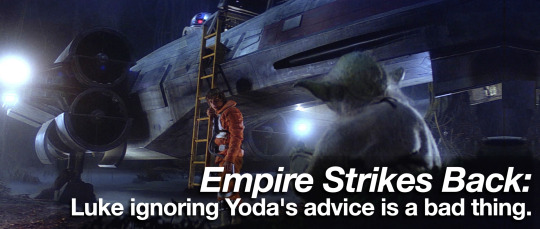
The myth:
Luke's Jedi mentors - trained to be dispassionate and mission-driven - callously tell him to let his friends die in service of a greater cause.
"In The Empire Strikes Back, Luke becomes Yoda's Padawan, and there are echoes of Anakin's training and the dilemmas he faced. Like Anakin, Luke is told he is too old to begin the training. Like Anakin, he has a vision of his loved ones suffering in captivity, and receives cold advice from Yoda, who tells him to sacrifice Han and Leia if he honors what they fight for." - Jason Fry, “Family Tradition; Rejecting the Jedi Teachings” Star Wars Insider #130, 2012

The intended narrative:
The Jedi are actually right on all points. Luke isn't ready or fully trained and he's arrogantly letting his emotions rule him and rushing into danger. By ignoring them, Luke gets himself into a spot of trouble that actually jeopardizes the lives of the very friends he tried to help, as they now need to rescue him.
“It’s pivotal that Luke doesn’t have patience. He doesn’t want to finish his training. He’s being succumbed by his emotional feelings for his friends rather than the practical feelings of “I’ve got to get this job done before I can actually save them. I can’t save them, really.” But he sort of takes the easy route, the arrogant route, the emotional but least practical route, which is to say, “I’m just going to go off and do this without thinking too much.” And the result is that he fails and doesn’t do well for Han Solo or himself.”
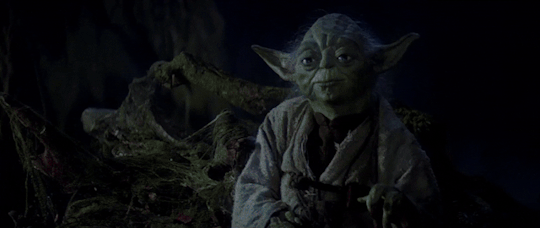
“Luke is making a critical mistake in his life of going after- to try to save his friends when he’s not ready. There’s a lot being taught here about patience and about waiting for the right moment to do whatever you’re going to do.”
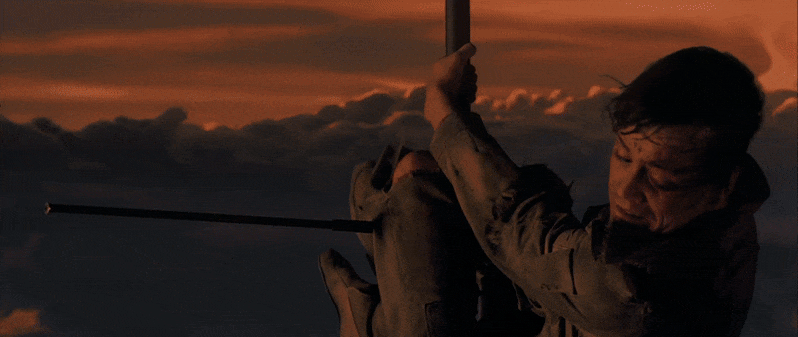
“Luke is in the process of going into an extremely dangerous situation out of his compassion— Without the proper training, without the proper thought, without the proper foresight to figure out how he’s gonna get out of it. His impulses are right, but his methodology is wrong.”
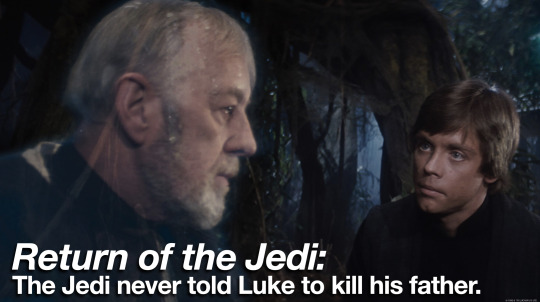
The myth:
The Jedi want Luke to repress his feelings and kill his father, to destroy the Sith, their religious enemies. As emotionally-detached Jedi, it is inconceivable that a Sith would come back from the Dark Side, and thus wrongly believe that the only solution is to kill Vader.
"It's easy to miss that Luke disagrees sharply with his Jedi teachers about what to do. Obi-Wan and Yoda have trained Luke and push him toward a second confrontation with Vader. He is, they believe, the Jedi weapon that will destroy both Vader and the Emperor. When Luke insists there is still good in Vader, Obi-Wan retorts that "he's more machine than man-twisted and evil." When Luke says he can't kill his own father, Obi-Wan despairs, "Then the Emperor has already won." But Obi-Wan could not be more wrong. It is precisely because Luke can't kill his own father that he defeats the Sith." - Jason Fry, Star Wars Insider #130, 2012

The intended narrative:
The Jedi never tell Luke to "kill" his father. That's just a fact.
They tell him to "confront" and "face" him.
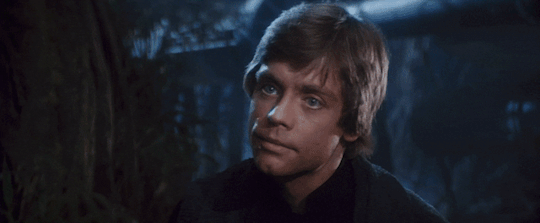
Their bottom line is that Vader and the Emperor need to be stopped.
If Luke can manage to do so without killing his father, that's great.
"In Jedi the film is really about the redemption of this fallen angel. Ben is the fitting good angel, and Vader is the bad angel who started off good. All these years Ben has been waiting for Luke to come of age so that he can become a Jedi and redeem his father. That's what Ben has been doing, but you don't know this in the first film." - Star Wars: The Annotated Screenplays, 1998
(credit to @writerbuddha for finding the above quote)
The problem is: Darth Vader has a track record of murdering loved ones who refuse to kill him. Be it his wife...
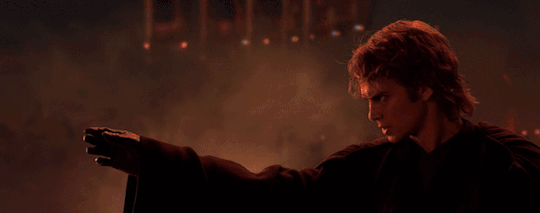
... his father/brother...
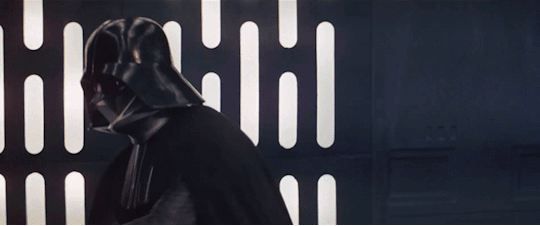
... and if you're going by Canon, his little sister.
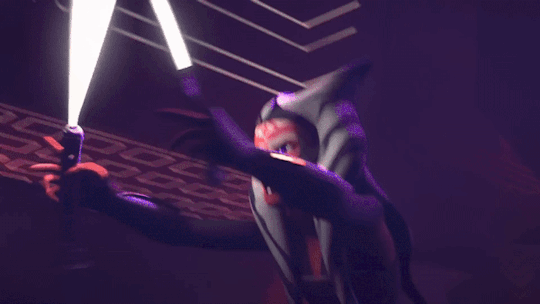
As such, there's a very strong chance that Vader might do the same to his son as well.
“A Jedi can’t kill for the sake of killing. The mission isn’t for Luke to go out and kill his father and get rid of him. The issue is, if he confronts his father again, he may, in defending himself, have to kill him, because his father will try to kill him.” - 1981 story conference, from The Making of Return of the Jedi
Now, as the last Jedi left, the fate of the galaxy rests entirely on Luke's shoulders.
If he dies, then the galaxy and its billions of inhabitants are doomed to live in a tyrannical dictatorship forever.
“He knows a confrontation is brewing between Luke and his father. Ben hopes Luke will either save his father or kill him, because whatever extra powers Luke's got in his lineage, he is the one person that can probably fight his father and win.” - The Star Wars Archives: 1977-1983, 2018
There's a time for talking things through... and a time to do your duty. Above all else, a Jedi's duty is to end conflict.
Obi-Wan was once tasked with this same duty.
And while he managed to weaken Vader considerably (thus avoiding the catastrophe of a full-powered Vader being unleashed onto the galaxy)... because of his attachment, he failed to kill Vader.
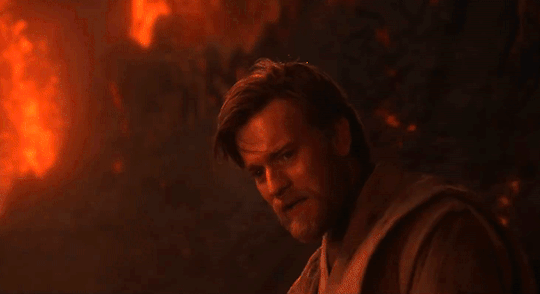
Twice, if you include the Kenobi show.
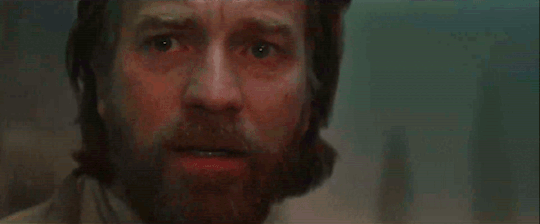
(A show which, per Pablo Hidalgo, is one of George Lucas' favorite recent Star Wars projects, a tidbit that doesn't surprise me one bit considering how much the series perfectly aligns with what Lucas said about Star Wars (see here, here and here))
Point being: because Ben failed his duty, the galaxy suffered for it.
Luke is now in danger of doing the same.
If he's unable to end the conflict in a peaceful way, then Luke needs to be ready to do so in a more permanent manner. Because while Luke has qualms about killing his father, there's a very big chance that the feeling won't be mutual.
So Luke isn't rejecting his teachers' orders to kill Vader. He's saying he's unable to confront Vader altogether, because he'll be half-assing the task. In the (very likely) worst case scenario where reasoning with Vader fails, Luke is concerned he won't be able to follow-through and do what he must.
Further, there's also a worse outcome to Luke dying: Luke joining the Dark Side and becoming yet another asset of the Emperor, more dangerous than Vader himself.
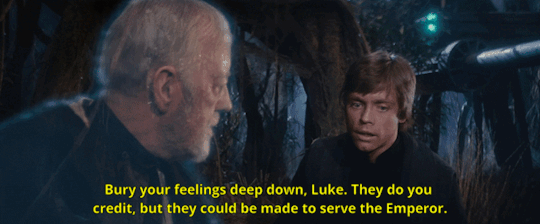
It's thus essential that Luke steel himself and mask his emotions, because the Emperor is a master manipulator who'll likely attempt to corrupt Luke via the strong emotions he has for his friends.
Obi-Wan is not telling Luke to repress his emotions. On the contrary, he acknowledges that these feelings do Luke credit. But the fact remains that when your opponent can jiu-jitsu those feelings against you and your friends, you need to keep a poker face.
And judging by how close the Sith Lords come to seducing Luke to the Dark Side...
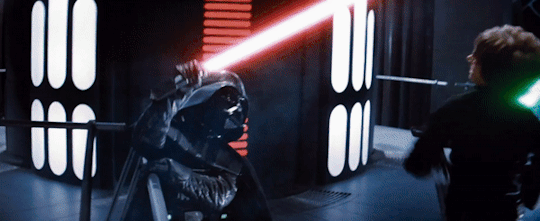
... that advice is completely on point.
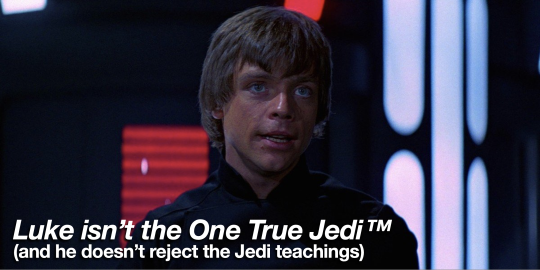
The myth:
"It isn't Jedi teachings that save the galaxy, but bonds the Jedi tried to forbid - such as the love of a father for his son, and a son for his father. Emotional attachments, in other words." - Jason Fry, Star Wars Insider #130, 2012

The intended narrative:
In Return of the Jedi, Luke isn't doing anything different than what other Jedi have done.
He does his best to avoid lethal force unless he deems that it is necessary (see his fight against Jabba's hostile forces).
He sacrifices himself for the greater good and let himself be captured, in order to allow the mission to be carried out.
He tries to reason with his enemy, hoping to avoid conflict.
He spares his enemy, showing mercy.
That's all standard Jedi stuff. We've seen other Jedi do all those things, both in the films and The Clone Wars.
If that isn't enough, just look at how Lucas describes what Jedi normally do (left), versus what Luke does in Return of the Jedi (right):
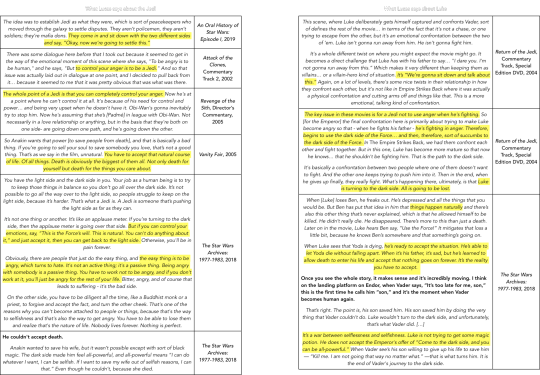
See what I mean? There’s pretty much no difference.
In Lucas' narrative, Luke isn’t “better than” or “rejecting the teachings” of the Jedi who came before him. He’s following the Jedi path. And he's really good at doing so.
Because this idea that Luke "rejects the teachings" makes no sense! They're Lucas' teachings. He agrees with the Jedi, they're the mouthpieces he uses to deliver the audience his own values.
Lucas having his main character do something he'd ideologically disagree with is something that doesn't make sense.
And part of this confusion comes from a misunderstanding of the word "attachment", in Star Wars.
It doesn't mean "emotional attachments" or "feelings" or "affection." It comes from the Buddhist principle of non-attachment.
It's not about depriving yourself of relationships or affection, it's about accepting that everything comes and goes and letting go of those very things you hold on to, when the time comes.
Lucas makes a distinction in his discourse between attachment and compassion.
"The whole idea of the movie, ultimately is that you have the Light Side and the Dark Side. The Light Side is compassion, which means you care about other people. The Dark Side is you care only about yourself. And you are obsessed with yourself. Getting your pleasure and getting all your stuff. The other one, you give it to everybody. You give goodness and health to everybody else. So the issue of love... there’s a line between loving somebody compassionately and caring about them and helping them. But the other line is not to be greedy or... once you are greedy then you get fearful. You don’t want to lose what it is you have that you are getting. So you have to learn to give up everything. And ultimately for a Jedi Knight, it’s very easy to give up." - Celebration V, Main Event, 2010
In-universe, this is something Anakin knew the theory of, but never really applied all that much.

Luke on the other hand, was able to learn the lesson and apply it.
Speaking in Lucas lingo, it's not Luke's attachment that makes him spare Vader. It's his compassion. And in turn, that compassion inspires Vader to do the same.
"It really has to do with learning. Children teach you compassion. They teach you to love unconditionally. Anakin can’t be redeemed for all the pain and suffering he’s caused. He doesn’t right the wrongs, but he stops the horror. The end of the Saga is simply Anakin saying, ‘I care about this person, regardless of what it means to me. I will throw away everything that I have, everything that I have grown to love - primarily the Emperor - and throw away my life, to save this person. And I’m doing this because he has faith in me, loves me despite all the horrible things I’ve done. I broke his mother’s heart, but he still cares about me, and I can’t let that die.’" - The Making of Revenge of The Sith; page 221
Or, to put things more simply:
Attachment (selfish love), is what makes Anakin do this:
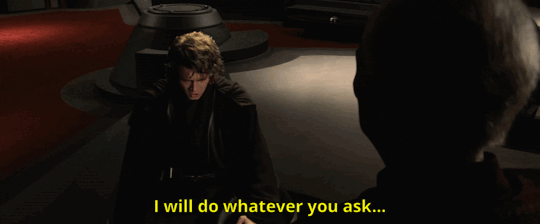
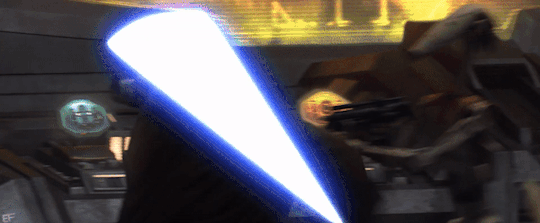
Compassion (selfless love), is what makes Luke do this:
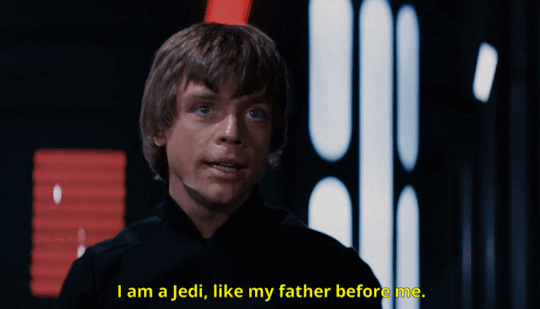
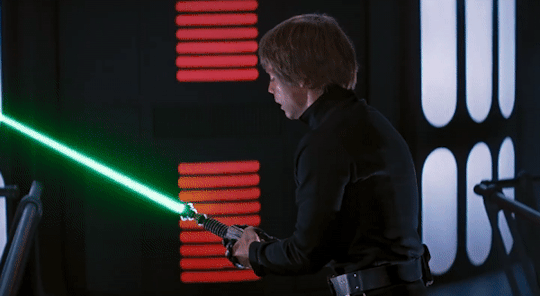
Now, could Lucas have made his narrative more explicit, to avoid confusion? Maybe.
But I think it's also fair to point the finger at the biggest cause of these muddied waters:
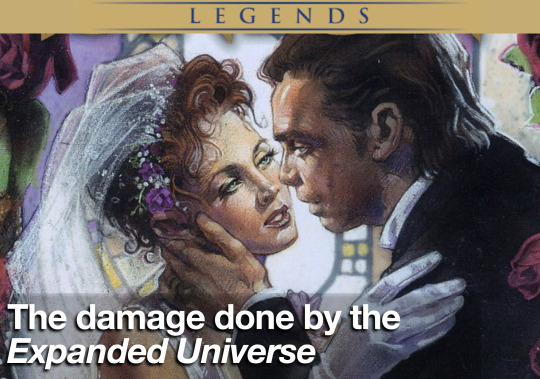
Simply put, the Expanded Universe (the Star Wars books, novels and games that spun out of the films) established new lore elements that didn't necessarily align with Lucas' vision of things. Namely:
Jedi can get married, and Luke marries Mara Jade.
Jedi can begin their training as adults, and Luke takes on many apprentices that are already adults.
When considering George's minimal involvement in the development of EU stories, it's easy to see why these plot points were allowed to come through.
But when he made the Prequels, his headcanons came to light and the above plot points needed to be retconned.

George Lucas' narrative:
"Nope. You can't be a Jedi and be married."
This isn't actually coming out of left field.
When Timothy Zahn asked for Luke and Mara to be married or engaged, back in 1993, Lucasfilm initially vetoed the idea.
And over the years, Lucas and other Lucasfilm employees have made it it clear that "Luke getting married" did not align with his vision (so much so that it's a plot point in Attack of the Clones).
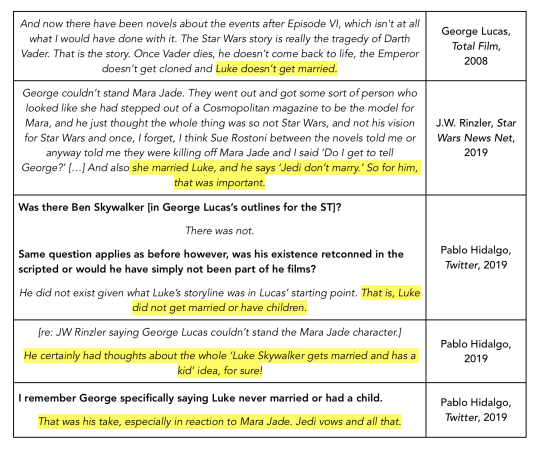
So the question becomes: why can't Jedi get married?
It's about commitment.
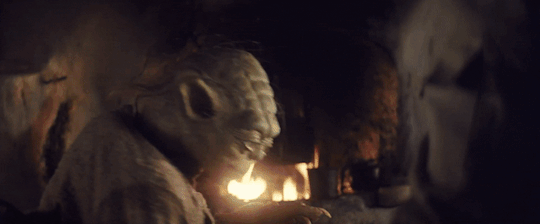
Simply put: you can't have two marriages. Eventually, your commitment to one of them will falter and you'll ruin them both. A Jedi is already married to the cause and to the Order.
If they want to get married, they have to leave the Jedi.
"One of the things [the Jedi] give up is marriage. They can still love people. But they can’t possess them. They can’t own them. They can’t demand that they do things. They have to be able to accept the fact, one, their mortality, that they are going to die. And not worry about it. That the loved ones they have, everything they love is going to die and they can’t do anything about it. I mean they can protect them as you would ordinarily protect, you know, ‘Get out of the way of that car.’ Somebody charges you with a gun, you knock the gun out, but there is an inevitability to life which is death and you have to accept that." - Celebration V, Main Event, 2010
And this is another example, really, of how Lucas' own values and past experiences shape the Jedi's teachings.
Marcia Lucas divorced George because he was constantly working on Star Wars, even when he wasn't directing it, which she said led to an emotional blockage in their marriage...
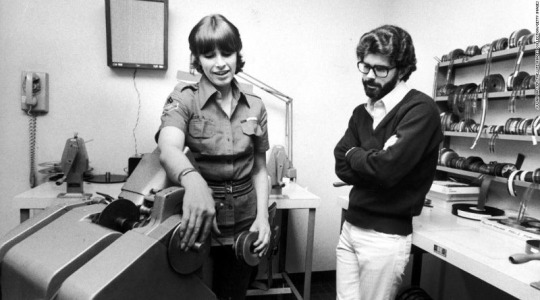
... and this leads us to the reason why George didn't double-down on the success of the Original Trilogy: he decided to take time off to raise his three kids as a single Dad.
He learned his lesson, reasoned that he wouldn't be able to be both a good, present father and a successful blockbuster film director.
When you're dealing with time-consuming commitments of this scale, you need to make a choice, or you'll end up (half-assing and thus ruining) both of them.
"Nope. Jedi get taken in as babies for a reason."
Once again, this has to do with Lucas' definition of "attachment."
"Jedi Knights get taken from their families very young. They do not grow attachments, because attachment is a path to the Dark Side. You can love people, but you can't want to possess them. They're not yours. Accept that they have a fate. Even those you love most are going to die. You can't do anything about that. Protect them with your lightsaber, but if they die they were going to die. There's nothing you can do. All you can do is accept that fact. In mythology, if you go to Hades to get them back, you're not doing it for them, you're doing it for yourself. You're doing it because you don't want to give them up. You're afraid to be without them. The key to the Dark Side is fear. You must be clean of fear, and fear of loss is the greatest fear. If you're set up for fear of loss, you will do anything to keep that loss from happening, and you're going to end up in the Dark Side. That's the basic premise of Star Wars and the Jedi, and how it works. That's why they're taken at a young age to be trained. They cannot get themselves killed trying to save their best buddy when it's a hopeless exercise." - The Star Wars Archives: 1977-1983, 2018
Jedi need to maintain objectivity and neutrality, in their day-to-day lives of mediating peace between planets.
And learning to "let go of your attachments when the time comes" is part of that training. But it is something that takes discipline and time, and thus the child needs to be young enough to develop this skill. Otherwise, they end up like Anakin, who always struggled to properly learn it and eventually was doomed by his greed.
This being part of Lucas narrative is also evidenced that in his earlier plans for the Sequel trilogy, he'd have Luke train children, not adults like he does in the EU.
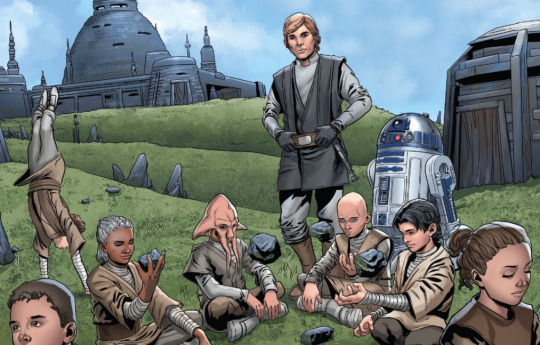
"Luke is trying to restart the Jedi. He puts the word out, so out of 100,000 Jedi, maybe 50 or 100 are left. The Jedi have to grow again from scratch, so Luke has to find two- and three-year-olds, and train them. It’ll be 20 years before you have a new generation of Jedi." The Star Wars Archives: 1999-2005, 2020

The EU's retcons of Lucas' narrative:
Now, obviously, the addition of all these rules and other elements such as midi-chlorians... it does something to the older audience. They grew up on the Original Trilogy, dreaming they could be a Jedi too if they just believed enough. Now that bubble is burst.
"Wait, if I'm a Jedi I can't get married?! And I need to be taken in as a toddler, with a certain kind of blood score?! That's bullshit!"
More importantly... it goes against about a decade's worth of established EU lore (which Lucas never factored into his storytelling)!
So what does Lucasfilm Licensing do? They go with it.
They take these "weird" rules the older audience and authors don't like, and retcon a new narrative around them to ensure both the books and the new films all stay canon within the EU own continuity.
George Lucas revealed new information about his universe in Episode II that ran counter to earlier stories of the Expanded Universe. Among the surprises: the Jedi Order is monastic, with love and marriage forbidden to its members. This would necessitate reforms to the Jedi Code over time to separate the ancient era when Nomi Sunrider was married to a Jedi, seen in the Tales of the Jedi (1993–94) comics, as well as the post-Empire era when Luke Skywalker married Mara Jade in the comic series Union (1999–2000). LucasBooks also needed to create plausible exceptions for Ki-Adi-Mundi, a Jedi Master who had multiple wives in the Prelude to Rebellion comics (1999). - Pablo Hidalgo, The Essential Reader’s Companion, 2012
When it comes to Luke specifically, the narrative becomes:
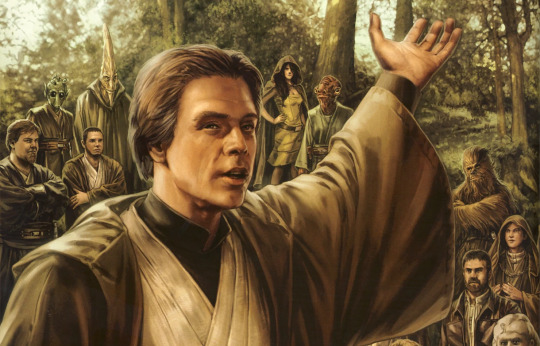
"Uh... y-yes. The old Jedi Order forbid marriage, only took in toddlers and had a blood pre-requisite... which was weird, wrong, too detached, too systemic, and part of why their Order failed! But, uh, Luke's New Jedi Order allows marriage, unlike his dogmatic predecessors, because anyone can be a Jedi guys!" Hahaha! (fuck's sake George)
But as already explained above: those new rules aren't meant to be perceived negatively. It would make no sense if they were, they're based on Lucas' own values.
You know what it does do, though?
It cements the narrative that Luke is the One True Jedi™, who rejected the dogmatic teachings to forge a new path forward.
That's not the intended narrative of the Original Trilogy, nor the six-film saga as a whole.
If you've made it this far in the post (congratulations) and are interested to read another all-encompassing post about that, you can check out the link below :)
#long post#REALLY long post#meta#luke skywalker#anakin skywalker#ben kenobi#star wars#george lucas#jedi order#yoda#jedi#empire strikes back#return of the jedi#the empire strikes back#original trilogy#tesb#ESB#ROTJ#star wars rotj#sw rotj#darth vader#sam witwer#dave filoni#attachment
747 notes
·
View notes
Text
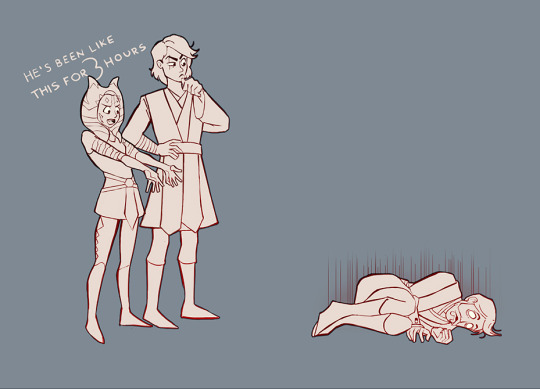
when the horrors catch up and you take an evening off to batch-process
#obi-wan kenobi#anakin skywalker#ahsoka tano#maybe obi-wan just read the outline for the next wip#why do i love to torture him so#one of my fav fanfic genres has to be meta fic horror#just imagine. how deeply disturbing it must be to find out you're a fictional character#somebody has *intentionally* written all those horrors onto you#and it wasn't even the guy who created you#he did his part. but the ppl who love it most to ruin your life and see you suffer are your fans#it's not enough that there's prob a lot of jedi rpf around in the gffa already. scarred obi-wan for life#lmao drawing anakin like this gave me so many flashbacks to my old ocs where almost every male character had that hair#also i have a job interview in one hour dsdsfhjgj#my art#prahacat draws
2K notes
·
View notes
Text
The “What if Dooku Trains Obi-Wan instead of Qui-Gon AU” is genuinely precious to me and I think they would thrive.
Still, can you imagine how much initial adjustment it take be for Obi-Wan “Qui-Gon Isn’t Following The Rules and It’s Giving Me a Stomach Ache” Kenobi to be trained by the guy Qui-Gon learned that from?
A typical Master Dooku mission canon example from Dooku: Jedi Lost
Dooku: the mission is called Space Nascar and we have to do a shot everytime someone pisses me off Dooku: see the Council assigns me these sorts of elbow-rubbing rich people event missions because of my “good” “stable” personality Dooku: for example I’ve almost gotten in two separate fights and we’ve been here five minutes Dooku: Now let’s go steal a speeder, I just Force-threw a cop
Qui-Gon is rattled by this. QUI-GON JINN.
On the other hand, Obi-Wan’s existing partnerships prove he’s able to thrive under chaos. Dooku, for all his faults, seems to have the singular ability as a Master to produce incredibly self-confident students. He’s repeatedly established as someone who genuinely loves teaching and is a natural at it, who is at their best when part of a Master Padawan partnership - which seemed to be a struggle for Qui-Gon. Ultimately he and Obi-Wan built a loving, successful partnership, but in every timeline it seems to have been initially rocky and took years to flourish. The difference in Obi-Wan having a Master who is tremendously engaged and invested in him from the get-go, but also deeply chaotic?
Makashi Chaos Monster Obi-Wan. Oh no, he’s a duelist just like his dad and bitchier than ever! The part of him that is inclined to say things like “Sith Lords are our Specialty” is given room to grow and thrive. His monologues increase tenfold and he has a lightsaber form where they’re built right in. The quips! The amount of leaving a conversation that’s going badly by jumping out a window (pulling a Dooku)!
It’s so beautiful. 🥲
#dooku#obi wan kenobi#star wars meta#qui gon jinn#this is not qui-gon critical btw I think him not being a natural teacher but blooming into one over their partnership is truly beautiful#dooku was probably a fucking mess the first few years of training rael#disaster lineage
1K notes
·
View notes
Text
Thinking a lot about how by the time TCW comes about Anakin has already committed a grievous sin, already committed a massacre, already chosen his side in some ways. The man Ahsoka knows, the only version of him she ever gets to know, is built on an assumption of purity he has already lost.
He has already begun to fall, and this slip contributes in so many ways to his inability to pull himself back. Because the only person other than Padmé he tells his crime to is Palpatine, because he's the only person who won't judge him (and that in and of itself is a measure of his immaturity–– because he deserved to be judged).
And this contributes so much to Palpatine's control because he has this piece of the puzzle, this ability to go "Oh, but what about this?" any time Anakin tries to pull back from Palpatine's confidence. Because they both know if he ever admitted it to the Order he'd forever lose their approval, and that's what matters most. So Palpatine has this advantage, because he knows more about Anakin than anyone else and Anakin doesn't feel he can confide in anyone else.
But the thing is: for so long, Anakin wants to be better, wants to amend himself for this sin and more than once wants to confess to Obi-Wan, but every single time Palpatine is able to go "Oh but he thinks he's so much better than you, he would never understand you, he would judge you and tell the Order and they'd cast you out" but... Obi-Wan would have forgiven him anything.
I think a lot about Obi-Wan being such a Perfect Jedi (in the eyes of everyone else if nothing else) and how much that hurts Anakin. Because every time he tries to pull himself back from the ledge this epitome of what it means to be a Jedi is just there in his face reminding him of his own failure
#yeah. this is just a stream of thoughts but yaknow#type: meta#fandom: star wars#star wars#sw#star wars prequels#darth vader#anakin skywalker#obi wan and anakin#star wars anakin#lord vader#vader#sheev palpatine#sw palpatine#palpatine star wars#star wars palpatine#palpatine#star wars the clone wars#sw prequels#tcw#obi wan kenobi#sw tcw
820 notes
·
View notes
Text
The Twinkification of Obi-Wan Kenobi
Hi everyone! I have emerged from the abyss to posit an opinion and analysis about something that has been ongoing in my corner of the fandom for some time now and I just wanted to share my thoughts. Please note that this is not meant to be a call-out post. If you have made references to Obi-Wan being a twink, we are cool, we simply have a difference of opinion! As always this blog is an open space where people from across the fandom are welcomed and loved.
With that being said:
The Co-Opting of "Twink"

It isn't uncommon to come across the term "twink" nowadays while scrolling the social medias. In fact, there are several videos referencing men, both real and fictional, using "twink" as a kind of affectionate endearment.
Is there a big, beefy man who shows his emotions in your favorite TV show? Chances are he has been called a twink.
Looking at a cute post of a straight couple? There is a chance the woman has captioned her post with: I love my twink boyfriend! :)
Is there a trans man on your for you page? Peer in the comments: chances are he, too, has people teeming in his comments to call him a twink.
Let us be clear: this is not what the word "twink" means.
The term "twink" is a queer term that has become so mangled and co-opted by cis, straight people (especially women) that it has become misused across the internet. So what is it, exactly? "Twink" is a queer identifier. Traditionally, the term refers to gay men who are:
Thin
Not very muscular
Not hairy
Young
Of course, there is always room for nuance. Also, there are so many layers to this conversation I have not and will not address fully. However, the main purpose of this conversation is to discuss its relation to Obi-Wan Kenobi.
So You Want to Woobify a Warrior
Most of the time when I see someone refer to Obi-Wan as a twink, it is in reference to mid-thirties, mid or post-war Obi-Wan. I am not going to address sexuality here because I am a firm believer in allowing people their interpretations of characters' sexualities. Instead, here are some photos of Obi-Wan Kenobi during and a bit after the era previously mentioned, and of his actor, Ewan McGregor:
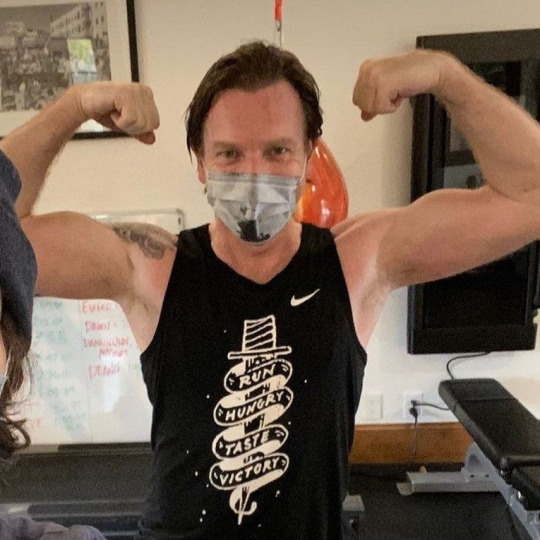
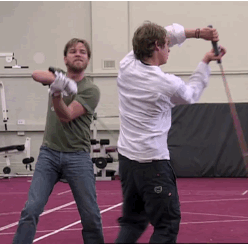
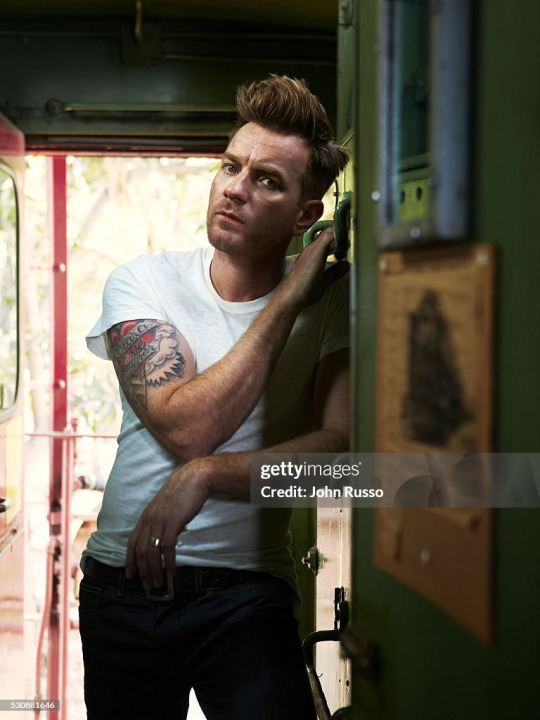
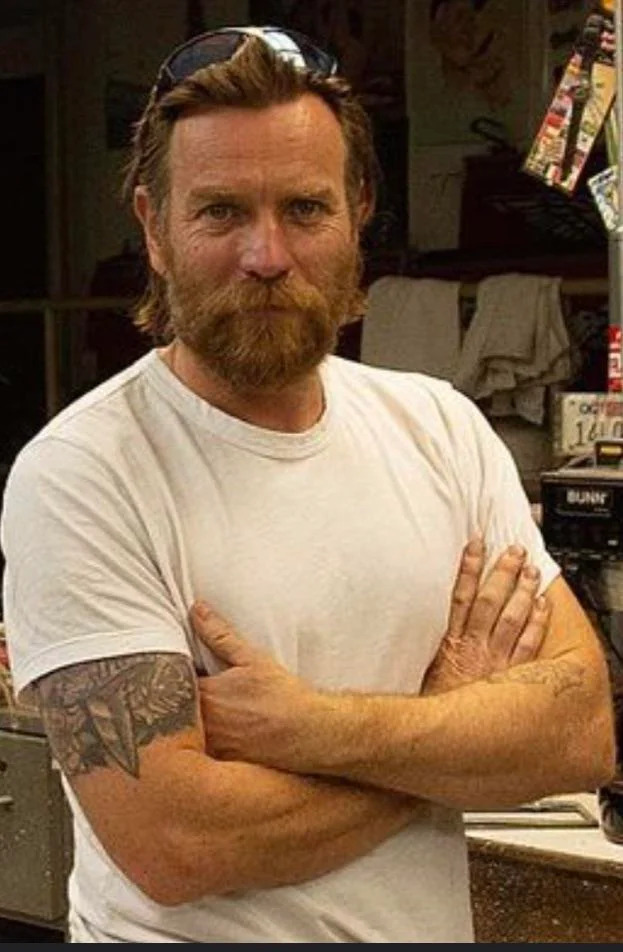

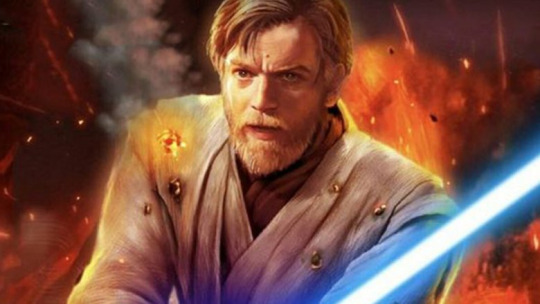
Here are some things of note: Ewan and Obi-Wan are not especially petite. They are muscular, hairy, and visibly middle-aged. Or at least, visibly older than 20s.
In Karen Miller's Wild Space, Bail Organa throws up in his hands out of fear when Obi-Wan is having hallucinations and moves to attack him.
In Christie Golden's Dark Disciple, he punches a droid in the face and it stumbles back.
My point here is that Obi-Wan is intimidating. He underwent years of rigorous training, fought in battle after battle, and is an expert in martial arts. The chances of him escaping that with the appearance of being boyish, early 20s, skinny, and not muscular seem... slim. War does not typically have anti-aging effects.
I once saw someone on this app make a point that because Obi-Wan is portrayed as the more intuitive and emotionally regulated character in contrast to Anakin's brash violence, he is perceived as more feminine. Therefore, he is more "coddleable." And, furthermore, the "feminine" narrative lends itself to the stereotypical parts of the label of twink. (Again, there is a deeper conversation to be had there. I am generalizing).
Unless Obi-Wan has been extensively malnourished, shaved, and de-aged, I don't see sense in seeing him as a twink.
The part of all this with even more implications associated is that I see a lot of this mentioned in relationship to Obi-Wan being in a relationship with Cody. There is a lot of comparison there, usually positioning Cody as the strong, indestructible warrior of whom Obi-Wan is either envious of or saved by. The racist undertones there are infinite and have been addressed and readdressed, especially by POC in the fandom.
Anyways gorgeous people, this concludes my thoughts, as it is very late. I am hoping to be able to participate in Codywan First Kiss Bingo, but I was hit with the flu and have been working diligently to catch up in my uni classes. I love you all and wish you nothing but the best!
159 notes
·
View notes
Text
“Why would Padmé choose Anakin when Obi-wan was right there” maybe because Anakin is truly the only person who ever understood her as their humanity was taken from both of them at a very young age and they have rolls to fill that very few people can ever understand.
Maybe because Obi-wan is 11 years older than her (he was 25 in TPM and Padmé was 14) and also Obi-wan is so rigid in his worldview whereas Padmé isn’t. She sees light in the dark, and dark in the light, and Obi-wan cannot comprehend this. Anakin embraces both sides of himself.
I also think Padmé choosing Anakin says a lot about Padmé as a person, but I think it also says a lot more about who Anakin was. He’s got cringy ass pickup lines but he is raw, he is passionate, and he does not shy away from what he feels even when it’s possibly wrong. Even when it’s definitely wrong. And Padmé always has to hide what she’s feeling in her line of work, so being with someone like Anakin allows her to embrace the full experience of being alive, the full range of emotion, and she isn’t judged for it by him, because he feels it all too.
They are both extremely passionate people.
Anakin’s love burns brighter than anything in the universe, and while it is his downfall, it is also his saving grace. That light never truly is extinguished within him.
Padmé chose Anakin because they were two halves of a whole. Because there was no choice. They found themselves in each other.
#star wars#anidala#anakin skywalker#padme amidala#anakin and padme#obi wan kenobi#star wars prequels#Darth Jess#Star Wars meta#padme and anakin
295 notes
·
View notes
Text
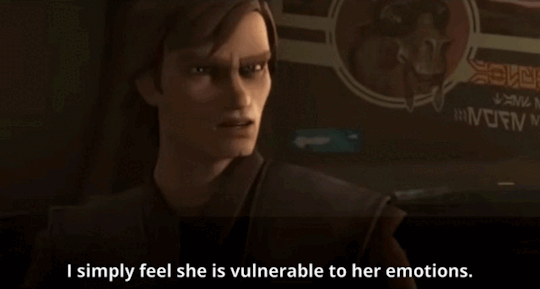
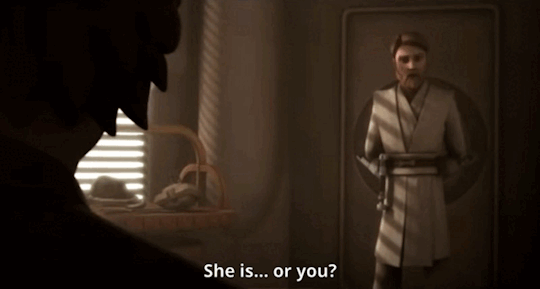
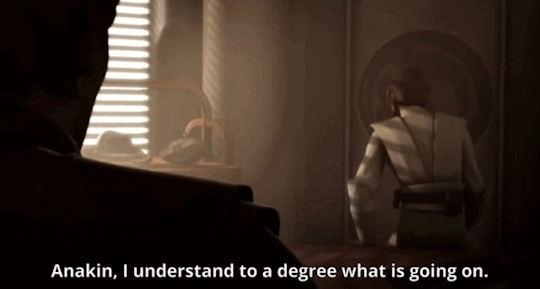
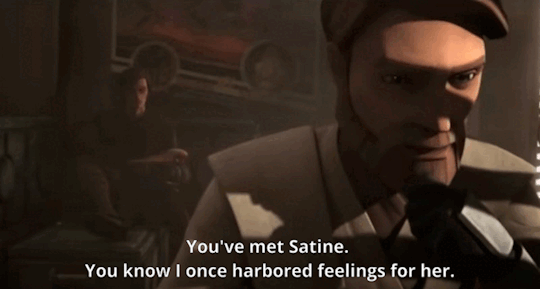
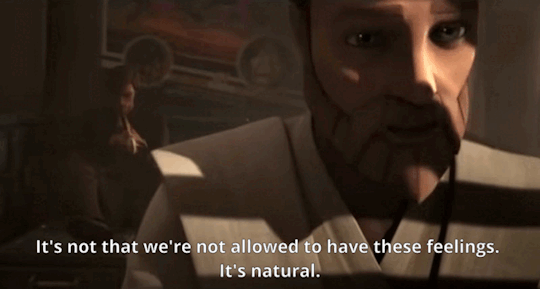
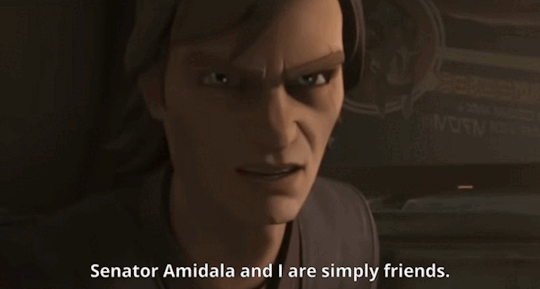
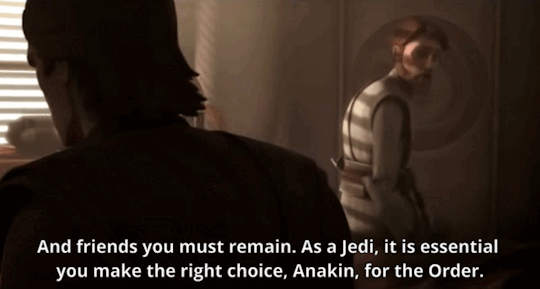
Hot Take: I don't think Obi-Wan is being literal in this scene, but instead asking Anakin to read between the lines and to maintain the delicate balance he's kept thus far with his relationship vs his duty to the Jedi Order. The way Obi-Wan is written over the course of the story often implies that he knows about Anakin and Padme's relationship--Padme tells Anakin that Obi-Wan came to see her in Revenge of the Sith because he's worried about Anakin, Obi-Wan goes to her when he's trying to find Anakin after Order 66, or even in TCW where he sees Anakin sneaking off while making Rex cover for him and knows it's about Padme.
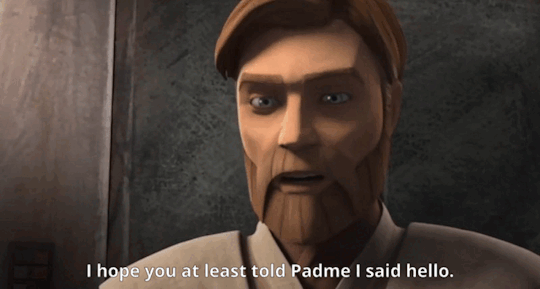
Obi-Wan knows that Anakin and Padme are in some sort of relationship. He doesn't know the depth of it, he doesn't know that they've been married for years at this point, but he does know that they have feelings and are acting on them to some degree. He's never said anything to stop it before. In this moment where he talks about Satine and feelings, it's not just a regular chat, it's specifically about Anakin having lost it, this is after he's become emotionally volatile about Padme, after he beat Rush Clovis pretty badly (to the point that he scared Padme off their relationship for awhile) and is obviously unbalanced. I don't think Obi-Wan is literally asking him to stop the relationship, he's pointing out that feelings are natural, of course they're allowed within the Jedi, but that Anakin is sliding into dangerous territory and he's asking that Anakin work to regain the equilibrium he had before this, to refocus on his internal balance and find it again. Because, several episodes later, when Anakin has calmed down and refocused himself, Obi-Wan knows he's still seeing Padme and doesn't object again. He's not trying to stop it even knowing that it's still going. Obi-Wan isn't asking Anakin to give up the relationship for the Jedi Order, but to take a step back and get his shit together again for the sake of the Order. He's just asking Anakin to read between the lines to understand what he's actually saying (keep the relationship, feelings are normal and allowed, but get your cool back together), because that's how Obi-Wan speaks and this is a delicate conversation. He's asking Anakin, if you're going to keep this relationship, you have to maintain your balance with your emotions and not fly off in a rage about it, because you are a level 100 psychic space wizard who can kill people with your mind powers when your emotions are out of whack.
737 notes
·
View notes
Text
the deliberate erasure of Padme Amidala and Satine Kryze from every piece of Star Wars media where it would be narratively and thematically relevant to mention them is absolutely insane
because how did we get to a place where we can have two separate shows that collectively co-star three of Padme's best friends and her child and only get one (1) oblique mention? How did we get two whole shows focused on Mandalorians and post-Imperial Mandalore, one of which co-stars Satine's sister, and not mention the Last Free Ruler of Mandalore? How did we get a show focused on Obi-Wan Kenobi and not mention one of his best friends or the love of his life? How did we get a show focused entirely on politics and spying and the true birth of the Rebellion and not mention the fact that Padme helped build that? How did we visit Sundari and not mention Satine? How did we get an episode where Ahsoka literally attends Padme's funeral and never once says her name?
The fact that Satine is essentially confined to The Clone Wars despite her sister being the current co-protagonist of Disney's flagship Star Wars show while Padme has been basically erased from every single piece of Star Wars media that isn't the Darth Vader comics is baffling. It would be like Leia being completely non-existent and never mentioned in the sequel trilogy despite it co-starring her son, brother, and husband. It makes no sense, it's clearly deliberate, and it's extremely irritating.
#star wars#sw fanwank#sw meta#padme amidala#bo-katan kryze#satine kryze#ahsoka tano#obi-wan kenobi#bail organa#mon mothma#andor#kenobi 2022#tales of the jedi#the mandalorian
4K notes
·
View notes
Text
Use this one trick to instantly fix all childhood trauma (Jedi Masters don’t want you to know this)!!!!!
That is what every “if Obi-Wan had just— *adds one extra scene to canon* —then Anakin would’ve had perfect mental health and never listened to Palpatine at all,” sounds like to me. Look I am not an expert on any kind of psychology at all let alone early childhood development but,
It is possible to do your very best to help or raise someone and still have bad or imperfect outcomes, especially when you have someone actively, secretly working against you (cough cough Sith Lord of the month cough), (for many reasons, but in this case particularly), because unravelling the mindset built in early childhood is hard, actually.
Coming at this from the “raised in a safe and loving environment” side of things, it took me years to figure out and internalize that my friends whose parents weren’t as great as mine were functioning in an entirely different landscape when it came to their interactions with adults.
Many years ago when I was in middle school a friend (acquaintance? idk I think most people thought I was annoying) told me that her ankle kept giving out and causing her pain. I asked if she'd told her parents so she could rest or go to the doctor. She told me she had, but her mother either hadn't listened or refused to help. My (approximate) responses?
"So it's not actually that bad then?"
"You should tell her again."
"Are you sure you explained it right?"
The only explanation I could comprehend at the time was that there must have been some unclear communication about the situation or its severity--if her mother had understood she was in pain, she couldn't possibly have just not done anything about it? Adults are responsible, caring, etcetera! They wouldn't do that?!
With more experience, I've come to understand better, and learned to respond in kinder, more helpful ways, but the shift in mindset was not and is not intuitive.
And I had the luxury of figuring all that out whilst being safe myself. Coming from the other direction, being in danger and trying to figure out why other people act like the world is safe? I can't say for sure, but I imagine it’s a lot more complicated.
Point with regard to Star Wars being, it really is harder for Anakin, coming in later, to acclimate to the Jedi ways and thought processes than it is for his peers who grew up in the safe environment of the Temple. And whatever arguments people want to have about how much psychology and therapy exist in the Star Wars universe, or how much “Jedi just do cognitive behavioral therapy” (not totally inaccurate, but reductive on several levels), no matter what the answers to those questions, it will still be harder for Anakin.
There is a reason the council changes its mind on training him only after he is suddenly famous and the Sith are proven to be back. When Anakin was not in significant danger of being snatched up by someone else, it was genuinely probably the easier and safer option—for him and everyone else—for him to live a different life.
The Jedi are not necessarily fully prepared for a child with Anakin's history, and, there is nothing bad about living an ordinary life. Anakin would not have been somehow unforgivably robbed by living life as a mechanic or an engineer or something, rather than being a Jedi.
Anakin is a victim of many things in his life—Sidious, Watto, Gardulla, Tatooine’s everything, his own conscious choices—but he is not a victim of malice, incompetence, or idiocy by the Jedi just because they couldn't—in only a decade or so—help him fully and perfectly unravel the mindset he developed in his early childhood. If there was any lack of qualification on their part, it was one they were aware of—but which was outweighed by the danger of little Anakin getting kidnapped out of normal-kid elementary school.
Being brought up in and around slavery absolutely made him more vulnerable to Sidous and became the basis of their dynamic as master and apprentice. Acting like the trauma that affects his mindset and actions for his entire life can be obliterated just by making minimal changes to the plot is wild to me.
And don’t get me wrong, fics and headcanons can do whatever they want, not everyone wants or is trying to write a deep psychological character study (also fanfic and even fiction in general cannot and should not be held to any standard of realism if it's not serving the story and the author)—simple fix-it’s (my love) are fun and an excellent short-cut to other things like happiness and fluff (my other loves)—but don’t act serious about the idea that adding one conversation about his feelings or one extra explanation about Jedi philosophy would automatically lead to Anakin having perfect mental health outcomes and always making good decisions.
Disclaimer (if the ones throughout weren't enough) : please go forth and do whatever you want. the moral of this post is actually just that (1) you won’t convince me, (2) I wanted to talk about this, (3) the clickbait title was too funny not to post, (4) i literally can't open my mouth without phrasing things like i'm in the middle of a heated debate, and (5) i continue to not be an expert in early childhood development—my evidence is very literally anecdotal
#star wars#anakin skywalker#mental health#click bait#jedi#obi wan kenobi#will continue to be annoyed about this on be half of both Anakin *and* the Jedi since they are alas not real to do it themselves#(actually annoyed about the concept being applied in real life but shhh this is a star wars blog)#P.S. anyone want to hear the rant about how I think this all works for Anakin in conjunction with Amavikka in the Double Agent Vader story?#cuz i can go on and on and--#*gets abducted for plagerism by whoever actually writes clickbait titles*#krayt meta
318 notes
·
View notes